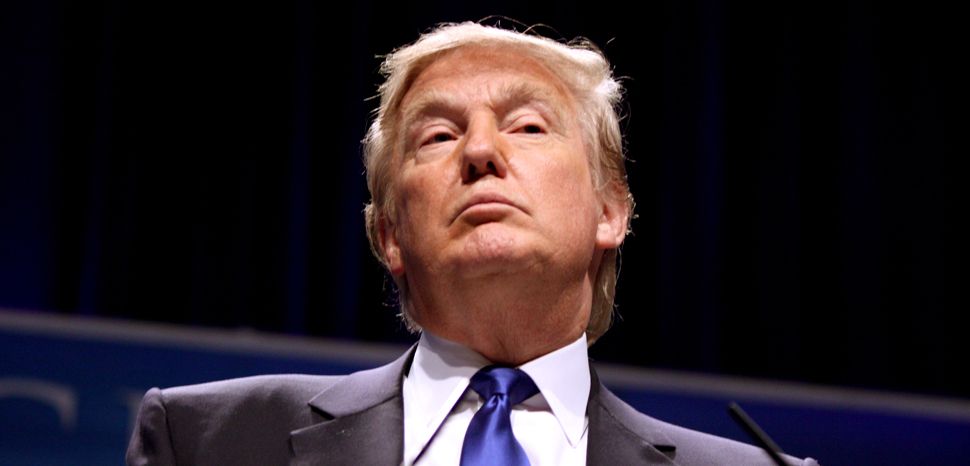The definition of insanity is doing the same thing over and over while expecting a different result; and while it would take a pretty liberal characterization to use it in the following instance, it’s plausible to describe the United States’ approach toward conflict in the Middle East over the past 50 years as quite literally insane. Because frankly, it is.
US President Donald Trump can be accused of almost anything besides knowing what he’s doing in foreign affairs. His lack of experience is a common worry amongst his critics and his countless gaffs never fail to annoy allies and enemies alike. And sometimes that disdain seeps out. Australia’s Prime Minister Malcolm Turnbull was caught on camera in 2017 mimicking Trump’s unique speaking style and exaggerated hand gestures while quoting him. “The Donald and I, we are winning and winning in the polls. We are winning so much! We are winning like we have never won before.” During an international meeting in Vietnam, Trump reportedly joked about New Zealand Prime Minister Jacinda Ardern while pointing right at her, to which she replied: “You know, no-one marched when I was elected.”
So when the President announced in December he would be pulling US troops out of the war-torn country of Syria, you can imagine the response. South Carolina Republican Lindsay Graham said he was “blindsided” by the move, continuing that “If Obama had done this, we’d be going nuts right now: how weak, how dangerous.” Former Senator Bob Corker of Tennessee, weeks before his final day in office, called it “obviously a political decision.” In the aftermath of the decision, Secretary of Defense James Mattis resigned in protest along with Brett H. McGurk, the American envoy to the coalition fighting the Islamic State, both claiming that the move would surrender the critical region to Iran and Russia.
Here’s the plain and short: these men, who came from the same military and political establishment that endorsed the invasion of Iraq and an endless war on terror, are simply wrong.
In 1970, Afghanistan had a pseudo-democratic government that was making significant strides in both social and economic conditions. Women wore mini-skirts while perusing the capital’s best shops and at social functions. This wasn’t even an anomaly for the time; the small, mountainous Asian nation had given women the right to vote in 1919, well before the United States or Great Britain. Women attended university and partook in political discussion without any real threat to their harm or safety. In almost all respects, it was decades ahead of even some European countries behind the iron curtain in terms of development.
Syria had over 20 democratically elected governments between 1946-1956, and while it did fall victim to several coups and constitutional challenges, its institutions didn’t completely collapse until the intervention of superpowers such as the United States and the Soviet Union. Iraq had a similar fate, eventually installing a dictator who would later enjoy the backing of the United States: Saddam Hussein.
While initially scarred by the betrayals of colonial powers such as France and Britain in the aftermath of World War I, the Middle East we find during the early part of the Cold War wasn’t completely democratic nor fair; but it was stable in its own way. So what happened? The Soviets invaded Afghanistan, which in turn led the Americans to back extremist Islamic rebels, which in turn, led to the rise of the Taliban and its hold over the country. The greed of the world’s self-proclaimed moral figureheads led to the annihilation of nearly a century of progress. Iraq too outgrew its usefulness to Western politicians and suffered the same fate.
Nixon, Ford, Carter, Reagan, Bush, Clinton, Bush, Obama; eight administrations that spanned decades of regime change and countless interventions that all amounted to not. Since 2010, Syria alone has cost $275 billion in lost growth opportunities. Turkey has spent over 7 billion euro of its own money. The results of these investments? One in every four schools in Syria is damaged, destroyed or used to shelter displaced people, and 5.7 million children inside Syria are in need of educational assistance. Estimated life expectancy at birth in Syria has dropped by 15 years during the five-year span of the conflict. 90% of refugees in Jordan and Lebanon are considered poor. Only 48% of Syrian refugee children have access to educational opportunities.
This reckless and ill-conceived instinct to jump head first into every fist fight that breaks out west of Jerusalem isn’t cheap either, with new studies showing it has cost Americans around 6 trillion since 2001. The report from the Watson Institute of International and Public Affairs at Brown University also found that more than 480,000 people have died as a direct result of fighting. Over 244,000 civilians have been killed. Another 10 million people have been displaced due to violence.
We have progressively become more involved and spent more money as time goes on; yet, things have undoubtedly gotten worse.
When military leaders express concern that we are essentially giving up on regime change in Syria with the withdrawal, they have every right to be worried, because that’s exactly what we’re doing. And it’s a good thing too. The Syrian civil war is practically over; Assad’s government has all but crushed the opposition in the last few years with Russian support. In order to revive the conflict, it would take nothing less than a full-fledged coalition led by the United States, something that would produce new tensions with Russia. Even if this resulted in a victory, it would bring another Iraq-esque occupation problem that would bog us down for the next decade.
In other words: even if we win, we lose. There is no reasonable or logical point to keeping our toes in the water if we aren’t willing to swim with the sharks.
Trump’s decision to pull US forces out of Syria, while admittedly needing some polishing up from State, is probably the best choice he has made so far in his presidency. The one major moral reason to stay in Syria, to provide security for Kurdish rebels in northern Iraq and Syria against Turkey, is also on the table in talks between Ankara and Washington, with Trump even threatening to sanction Turkey if it goes to war with the Kurds.
In his own naive, simplistic way, the president offered a pretty well-rounded defense of his reasoning to leave the conflict on Twitter: “Getting out of Syria was no surprise. I’ve been campaigning on it for years, and six months ago, when I very publicly wanted to do it, I agreed to stay longer.” He added: “Does the USA want to be the Policeman of the Middle East, getting NOTHING but spending precious lives and trillions of dollars protecting others who, in almost all cases, do not appreciate what we are doing? Do we want to be there forever?”
There are many ways we could paint this situation, but in order to get an accurate outlook, it’s important to look at the facts. President Donald Trump is a product of the revived right-wing populism that cloaked the 1930s and 1940s with a distinct isolationist backlash that, while nipping at the heels of Washington’s established order, never could quite take the reins of power. Senators like Ohio’s Robert Taft fought the good fight to the very end. In a way, the loud-mouthed businessmen from Queens is the spiritual successor of what those men never could do.
The type of “America First” politics that people like Trump adhere to puts them at odds with progressives across the aisle, except on one key issue: military interventions. While they disagree for different reasons, progressives because it is morally questionable and right-wing populists because they view it as a waste of American lives and money, the two sides nonetheless still broadly agree that military interventions are a bad idea. So while you’ll see plenty of Democrats calling Trump’s decision wrong and reckless, you’ll be hard pressed to find it as an issue among progressives like New York Rep. Ocasio-Cortez, Vermont Sen. Bernie Sanders, etc. In fact, based on their own political philosophies, it’s conceivable that, while they can’t admit it, they may even agree with Trump on this.
It’s a hard pill to swallow, I know. President Trump has made innumerable mistakes, committed countless gaffs, and quite frankly his rampant inexperience in foreign policy is damaging our already shaky standing in the world. But on Syria, this novice is doing something right. And maybe if he can end the battle we never could win, perhaps in time, he’ll win the war nobody wanted to fight in the first place.
The opinions, beliefs, and viewpoints expressed by the authors are theirs alone and don’t reflect the official position of Geopoliticalmonitor.com or any other institution.




